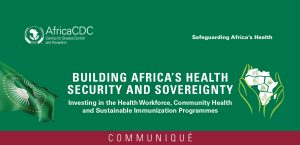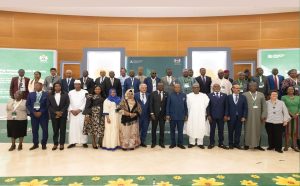The Africa Centres for Disease Control and Prevention (Africa CDC) is spearheading a continental Mental Health Leadership Programme aimed at equipping mental health advocates and leaders with the skills and competencies needed to address mental health challenges through a public health lens.
Launched last year at two training sites—the American University in Cairo, which trained 15 leaders from 13 African Union Member States, and the University of Ibadan, which trained 48 leaders from 25 Member States—the programme is expanding in 2025 to include three additional institutions: the University of Zimbabwe, the Kenya Medical Training College, and the University of Bouaké in Côte d’Ivoire.
So far this year, 84 participants from over 30 African Union Member States have graduated with certificates following training sessions hosted by the University of Zimbabwe (24 March–4 April) and the Kenya Medical Training College (12–23 May), in collaboration with Africa CDC.
The course has equipped the participants with leadership and advocacy skills to enhance the integration of mental health into primary health care, promote the uptake of mental health services and extend advocacy for meaningful and impactful participation of persons with lived experience.
The Mental Health Leadership Programme, under the Non-Communicable Diseases, Injuries and Mental Health (NCDI/MH) Division at Africa CDC, aims to strengthen public mental health systems, build a workforce for mental health practitioners, and support civil society organisations advocating for mental health. This programme is being implemented across five African regions, with support from the Wellcome Trust. It forms part of a three-year flagship initiative designed to develop transformative leaders in mental health.
Mental health disorders account for 13% of the global burden of disease, with depression being a leading cause of disability, says the World Health Organization. Africa remains severely under-resourced in mental health services, with fewer than one mental health worker for every 100,000 people in many countries. The Africa CDC Mental Health Leadership Programme aims to plug this gap by training professionals from diverse fields to strengthen the continent’s response to mental health challenges.
“We decided to allocate funding to mental health because it remains a neglected issue. Yet, ignoring mental health is keeping us from achieving Universal Health Coverage and every other major health goal,” said Dr Mohammed Abdulaziz, Head of the Division of NCDs, Injuries and Mental Health at Africa CDC, who said neglecting mental health is one of the major obstacles preventing Africa from achieving Universal Health Coverage.
The two courses held in Zimbabwe and Kenya received over 5,000 applications, reflecting the growing interest and commitment of public health professionals to advancing mental health across Africa.
A proposed online short course is also in the pipeline to provide introductory lectures, with physical sessions reserved mainly for discussions, group work, and the exchange of experiences.
The desire for more training arose from meetings with Ministry of Health officials, civil society, academics, and the religious community, who emphasised the need for strengthened cross-sector collaboration and political commitment to building community-based mental health support systems.
“This programme is a much-needed effort to strengthen leadership in mental health across our continent,” said the Non-Communicable Diseases Deputy Director in the Ministry of Health, Dr Justice Mudavanhu. “Mental health and NCDs have been neglected for too long in Zimbabwe, resulting in an unprecedented burden of both mental health conditions and NCDs,” said Dr Mudavanhu.
In Zimbabwe, the burden of mental health conditions continues to rise, driven by economic challenges, climate change, and social hardships.
“We must confront this reality with urgency, expertise, and commitment. This is why initiatives such as the Mental Health Leadership Programme are very welcome,” said Dr Mudavanhu.
Zimbabwe’s Minister of Health and Child Care, Dr Douglas Mombeshora, stressed the need for greater political commitment, financial investment, and improvements to mental health systems.
He voiced concerns about funding shortages, the brain drain of healthcare professionals, and the importance of treating mental health patients with dignity.
Dr Josiah Makombe, Chairperson of the Zimbabwe Parliament Portfolio Committee on Health and Child Care, also acknowledged the ongoing challenges in securing adequate funding for mental health services and stressed the need for innovative solutions to bridge these gaps, including exploring the potential of taxes and levies—such as the airtime levy—to support health initiatives.
Dr Makombe said a shift from traditional views on mental health to communities recognising it as a real public health issue was required. Establishing a mental health desk in every organisation to support employees was necessary, as mental health challenges are deeply influenced by socio-cultural and economic factors. Dr Makombe challenged Africa CDC to work closely with Parliamentarians in its programming, as they have a unique role in influencing policy, raising awareness, and reducing stigma when properly equipped with the necessary knowledge.
Advocating for the integration of health programmes, moving away from vertical approaches in favour of more cost-effective and efficient integrated solutions, could be another strategy, suggested Dr Abdulaziz.
Africa CDC boosted its outreach efforts by meeting Southern Africa Roman Catholic Church Bishops from Angola, Botswana, Eswatini, Lesotho, Mozambique, Namibia, São Tomé & Príncipe, South Africa, and Zimbabwe, who attended their 81st IMBISA Standing Committee meeting followed by Jubilee Celebrations at the Cathedral in Harare, Zimbabwe.
“We seized the opportunity to tell the bishops about the need for strengthened capacity for spiritual leaders on mental health wellness, mental health advocacy, and awareness,” said Dumisani Mamba, Africa CDC Mental Health Technical Officer. “The church, in a community-centred approach, plays an important role in fighting mental health stigma and discrimination, poor uptake of mental health services, and mobilising resources for mental health interventions.”
Africa CDC, in its efforts to promote mental health and prevent mental illness, recognises and acknowledges the role of spiritual leaders as drivers of change and advocates for the integration of a human rights-centred approach to mental health interventions.
“We have gained many useful insights and look forward not only to hosting the 2026 MHLP Course but also to making the course sustainable going forward,” said Dr Evelyn Makanza-Mazike, Consultant Psychiatrist at the University of Zimbabwe and Course Director.
Professor Joconiah Chirenda, Faculty of Medicine and Health Sciences Clinical Deputy Dean and Infectious Diseases Specialist, urged participants to use the knowledge gained to advocate for greater support for mental health programmes in their respective countries.
“This training is important for us as Africa. We are losing our youth to substance abuse. Mental health is one of the most neglected areas, and very few organisations are willing to fund mental health compared to diseases like TB, malaria, and HIV,” he said. Africa CDC has so far trained 147 mental health leaders since the programme’s inception.







